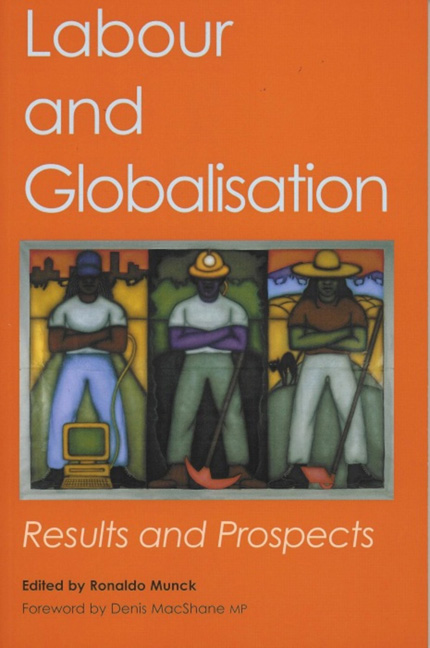Book contents
- Frontmatter
- Contents
- Acknowledgements
- Foreword
- Notes on the Contributors
- List of Abbreviations
- Introduction: Globalisation and Labour Transnationalism
- Part I Global Dimensions
- Part II Spatial Dimensions
- 5 Re-Scaling Trade Union Organisation: Lessons from the European Front Line
- 6 Australia and Beyond: Targeting Rio Tinto
- 7 International Solidarity and Labour in South Africa
- 8 Labour and NAFTA: Nationalist Reflexes and Transnational Imperatives in North America, 1991–1995
- Part III Social Dimensions
- Index
5 - Re-Scaling Trade Union Organisation: Lessons from the European Front Line
from Part II - Spatial Dimensions
- Frontmatter
- Contents
- Acknowledgements
- Foreword
- Notes on the Contributors
- List of Abbreviations
- Introduction: Globalisation and Labour Transnationalism
- Part I Global Dimensions
- Part II Spatial Dimensions
- 5 Re-Scaling Trade Union Organisation: Lessons from the European Front Line
- 6 Australia and Beyond: Targeting Rio Tinto
- 7 International Solidarity and Labour in South Africa
- 8 Labour and NAFTA: Nationalist Reflexes and Transnational Imperatives in North America, 1991–1995
- Part III Social Dimensions
- Index
Summary
My own favourite image of labour confronted by globalisation is a sporting one: the unions trot out on the field all kitted-up for football, and find themselves sliding about on the ice-hockey field of a Globalised Network Capitalism – or even confronted by the kind of electronic game incomprehensible to most over the age of 25. To their complaints that there had been no Collective Bargaining Agreement concerning the new game, the globalised and networked cyborgs they confront (‘half-beings, half-flows’), bleep back at them: ‘This-is-a-game. These-are-the-rules. If-you-don't-like-them-youcan- go-play-with-yourselves. Exterminate-exterminate-ate’. (Waterman, 1998: 366)
The dynamism of capitalism has always brought new challenges to working people and it is now clear that economic globalisation (among other things) is undermining existing forms of trade union organisation. As Waterman suggests, the structures, objectives and methods of twentieth-century trade union organisation are inadequate to protect workers’ interests today. In what Bauman (1998) calls ‘The Great War of Independence from Space’, some sections of capital have been liberated by geographical mobility, leaving workers weakened and stranded in place. Indeed, it is suggested that the mobility of capital has also accentuated the political divisions between workers, fragmenting solidarity between workers in different locations: ‘For the liberty of movement and for their unconstrained freedom to pursue their ends, global finance, trade and the information industry depend on the political fragmentation – the morcellement of the world scene’ (Bauman, 1998: 67–68; for similar arguments see Bukharin, 1972; Harvey, 1989). In such circumstances, workers are urged to re-scale and refocus their organisations by establishing new forms of international trade unionism.
Internationalism was, of course, common currency in the labour movement long before contemporary experiences of globalisation. Efforts to foster connections between workers in different countries stretch back over more than 150 years, as demonstrated by the history of the International Working Men's Association (the First International), established in 1864 (see Braunthal, 1980; Lorwin, 1929; Milner, 1990; Wills, 1998a). Yet this impulse to forge international solidarity between workers has waxed and waned over time depending largely upon national-level political opportunities, the reach of class struggle, geopolitical circumstances (most notably the Cold War), and economic change (see Cox, 1996; Herod, 1997; Logue, 1980; Thomson and Larson, 1978). Moreover, nationalism has historically brought greater returns to the labour movement than the lofty ideals of internationalism.
- Type
- Chapter
- Information
- Labour and GlobalisationResults and Prospects, pp. 85 - 104Publisher: Liverpool University PressPrint publication year: 2003

